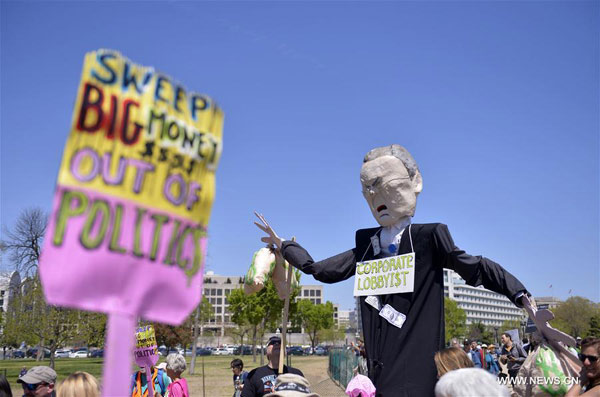
28 May, 2016
Chinese commentary: ‘Money politics’ erodes US political systems
BEIJING, (Xinhua), May 17, 2016 – With estimated record spending, the 2016 presidential election will be one of the most “money-burning” in the US history, which demonstrated that “money politics” is eroding the US political systems. Bloomberg has predicted that 10 billion US dollars will be spent on the 2016 US election, which has outnumbered the 2015 gross domestic product (GDP) of 30 percent of all the countries worldwide.

People take part in a rally against Money Politics at the west lawn of Capitol Hill in Washington D.C., the United States, on April 17, 2016. [Photo/Xinhua]
According to the Federal Election Commission, the expenditure spending for or against presidential, House or Senate candidates have exceeded more than 1.6 billion dollars by May 10. In fact, interest groups, soft money and lobbying are lawfully permitted in the US political culture.
Moreover, the ruling of the US Supreme Court in the cases regarding Citizens United v. Federal Election Commission and McCutcheon v. Federal Election Commission, has overturned decades of restrictions on corporations’ campaign spending and invalidated aggregate contribution limits, leading to unlimited influx of capital into the US political life.
In the Citizens United v. Federal Election Commission case, the US Supreme Court prohibited the government from restricting independent political expenditures by a nonprofit corporation.
In the case of McCutcheon v. Federal Election Commission, the Supreme Court reversed a decision that imposed a limit on contributions an individual can make over a two-year period to national party and federal candidate committees.
“Money politics” has resulted in a situation where the US politics is fully influenced by big billionaires and their proxies, while the will and appeal of the general public have no way to express.
Aquene Freechild, co-director of the Public Citizen’s Democracy Is For People Campaign, told Xinhua recently that “it was about a crisis for American Democracy. People are feeling more left out in the process, that their voice doesn’t count, that their vote is not being counted, that our government is being intentionally obstructed and broken.”
Public Citizen is a Washington-based public interest group that co-sponsored the week-long Democracy Spring protests in 30 cities across the United States in mid-April, including the one held in front of the Capitol Hill.
“So it was about voting rights, and big money and politics, corruption, and also about having courts that work,” Freechild said, referring to the aim of the protests held as the 2016 US presidential campaign kicks into high gear and money in politics becomes a heated topic.
“Our entire system is dependent on big money donors. It’s not impossible to run without big money as Bernie Sanders is showing, but it’s very difficult to win,” Freechild said.
She was talking about the Vermont senator who is mounting an impressive challenge to Democratic front-runner Hillary Clinton, former Secretary of State and wife of former US President Bill Clinton. Rather than raising fund from big donors, Senator Sanders has been relying on small donations, usually in form of 27 dollars, from grassroots supporters.
New York Times has said in a report that a small pool of rich donors dominates the campaign funding in the 2016 presidential race, highlighting the unprecedented concentration of political donors in the modern era.
Corporations, industries and a handful of extraordinary wealthy individuals spend big money on campaigns and on lobbying not for fun, but because they expect to get something back in return.
The Sunlight Foundation, a nonpartisan nonprofit organization, has said in its research that a total of 200 organizations spent a combined 5.8 billion dollars on federal lobbying and campaign contributions during 2007-2012 period, and they received 4.4 trillion dollars in federal business and support.
In a rough sense, for every dollar they spend on Washington, the biggest companies in the United States are getting more than 750 dollars back.
Former US President Jimmy Carter has called the current US political system an “oligarchy,” saying “with unlimited political bribery being the essence of getting the nominations for president or to elect the president … We’ve just seen a complete subversion of our political system as a payoff to major contributors.”
Unlimited money in politics violated the essence of what made America a great country in its political system, he said.



Liked this article? Share it!